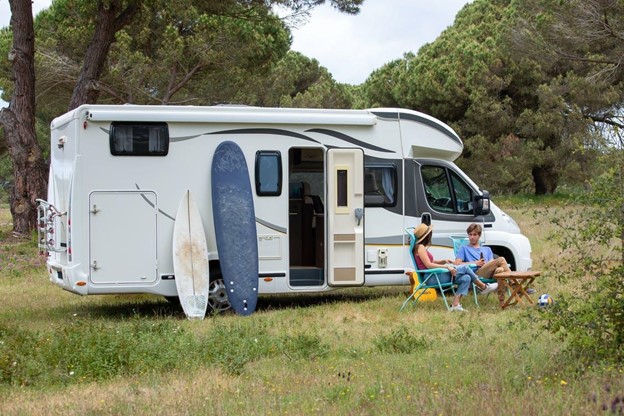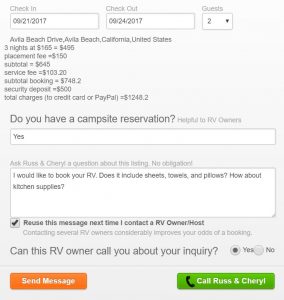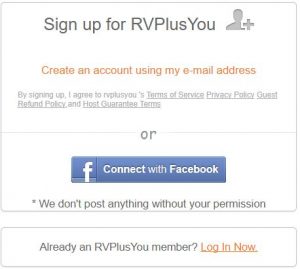No doubt about it: RVing in a rental camper is an inexpensive way to see the country. In the last one year alone, there have been over 2 million new renters, according to the 2022 KOA Camping Report. This underlines the popularity of traveling in a rental mobile abode.
Unfortunately, the recent hike in fuel and commodity prices is threatening this affordable travel lifestyle. To keep your vacation dreams alive this year and beyond, we’ll walk you through some clever ways to save money on the biggest expenses of a rental RV.
And if you’re looking for a stress-free camping experience, plus a way to maximize travel savings, book and have the RV rental delivered and set up at your campsite. You just need to drive your own car to the destination, enjoy your camping experience, then head home when finished. The owner will pick up the rig when you’re done.
What are the Biggest Expenses of Renting an RV Besides the Cost of the Rental?
Apart from the rental fee, the biggest costs of a rental RV are fuel, insurance, and add-ons:
Fuel
Since March 2022, the nationwide average for regular gas has been hovering between $4.0 and $4.5 a gallon, according to AAA. Adjusted for inflation, fuel is the highest it has been in almost 4 decades. In 2021, the national average price for gas was $3.043, meaning you’ll now pay around a dollar more for every gallon of fuel.
So, if you’re renting a Class C, which is the middle ground RV and has an average MPG of 12, expect to spend around $38 every 100 miles, $95 every 250 miles, and $380 every 1000 miles. Bigger and heavier rigs will cost even more to fuel. In fact, most RV owners report getting around 8 mpg with their gas-powered motorhomes.
Insurance
In order to rent an RV, you need to protect yourself with liability and damage insurance in case of an accident during your vacation. RV rental insurance costs range from $15 to $70 per night depending on the type, size, and features of the motorhome or trailer you hire, your driving record, the protection you pick, and the company providing it.
While you can pay for the level of coverage you want, keep in mind that meeting only the minimum insurance requirements on a rented RV can leave you financially exposed in case something happens. So, full coverage is always a smarter option.
One way to save on insurance is to get a rider. Some RV rental companies will give you the option to use a rider from your own existing car insurance to cover the RV. In other words, you can cover the rental with your own insurance company. State Farm charges $25 to add a car or RV rental to your existing policy. Check with your insurance professional to find out your options.
Add-Ons
RV rental add-ons or extras are another significant expense that makes up the total amount you will spend renting your RV. These are the additional and optional RV equipment and services you buy to make your trip more convenient and comfortable.
Add-ons can range from RV drop-off and preparation, tank damping, cleaning fees, pet fees, cookware, dishware, and linen, as well as gear such as camp chairs, a grill, and tents. There are also extra fees if you exceed the set number of free miles or run the generator excessively. Depending on the add-ons you pick, these charges can add 50% or more to the basic trip expense.
How to Have an RV Vacation Without Spending it all on Gasoline
Here are some ingenious tips to save money on RV fuel. Use them to have an epic RV camping trip without spending a dime on gas.
Go for an RV Delivery Service
If you want to RV without pain at the pump, have an RV delivered to your camping location by a service like RVPlusYou. This not only helps you save on fuel costs, but it’s also a great option for those who don’t want to drive or tow a big box on the busy highway. Get the RV dropped off and set up at your favorite campground, national park, or any other place you plan to camp for some time.
Try Stationary Park Rentals
A relatively new way to enjoy RV camping without fuel expenses is to rent a stationary camper at the campground. Basically, stationary RVs are park models, like cabins, but actual trailers that don’t move from the campsite where they’re set up. The cabin trailer has all the amenities you need to camp in comfort and is usually located in a campground that has attractions such as a beautiful lake with boating or fishing, hiking, or biking opportunities.
Camp in an RV at the Owner’s Property
Another smart tip to save gas money RVing is to stay in an RV at the owner’s property. You are booking at a specific location where the RV is stored. You can find these rentals on RVPlusYou, but also on other peer-to-peer websites like Airbnb and Hip Camp. Here is an example of Airbnb RV rentals.
Some RV owners who have spacious properties are allowing travelers to rent their RVs and stay on their land. Many of these owners are already located in amazing destinations, so you can use their property as a base for exploring the area’s attractions without having to drive the rig and pay for fuel. Most have full hookups for a more comfortable stay.
How to Save on RV Rental Insurance Costs:
Sure, one of the biggest costs of renting an RV is insurance. But can you go RV camping without paying for insurance? Yes, if you use RVPlusYou to have the camper delivered to the campsite. If you’re going to drive the rental RV, you’ll need to pay for insurance, as it’s a requirement in most states.
Also, some operators of RV parks may require you to have some protection. So, you’ll definitely need coverage. This, however, doesn’t mean that you can’t save on RV insurance. Here’s how to minimize this expense.
One way to save on insurance is to get an “insurance rider” from your own insurance company. Some RV rental companies will give you the option to use a rider from your own existing car insurance to cover their RV. In other words, you can cover the rental with your own insurance company and save big. State Farm charges $25 to add a car or RV rental to your existing policy. At $60/day for insurance, you save $275 on a 5-day rental. Check with your insurance professional to find out your options.
Rent from RVPlusYou for Zero Insurance Costs
When using other rental platforms, the cost to insure an RV rental that is driven by the renter adds as much as 20% to 40% to the nightly rental price. The average price is $60/day. But with RVPlusYou, you don’t have to pay a dime on insurance if you have the rig delivered to the campground and set up. The cost is already included in the platform’s guest fees, which are also less than the big guys.
Stay in a Stationary Camper
Insurance for stationary rentals costs less because the camper is only being moved by its owner, which is less risky. In some situations where the rig is parked permanently, you may not even pay a thing since it’s considered a lodging option. Also, RV owners who rent out their rigs on their land may not require you to have coverage, while others will only need a security deposit.
How to Reduce the Cost of Rental RV Add-Ons
Rental add-ons are one of the areas that RV owners make the most money from, but these extras come at an additional cost for renters. While some add-on services like RV delivery and set up are essential, others are not all that important. Here’s how to save on optional RV services.
Shop Around
Shop around to discover what each individual RV owner or rental company includes. Many of the RV owners on peer-to-peer websites, such as RVPlusYou, include many or most of these add-ons. This can save you hundreds on your rental.
Carry Camp Supplies from Home
It feels nice to find your rental RV at the campground already equipped with all necessities you need for a stress-free stay. But if you’re serious about saving money, bring some items to the campsite with your car. Linen, pots, dishware, bicycles, coolers, lawn chairs, and a grill are some of the things you don’t need to hire from the owner as you can easily carry your own.
Rent a Pet-friendly Rig
Pet add-ons can set you back as much as $100 to $150. So, if you travel with your furry friend, it’s best you rent an RV that’s pet friendly. The owners of these rigs don’t charge extra fees for bringing your pet onboard and place no restrictions on the size or number of pets accompanying you. Plus, they may even have special features to make your fur baby feel right at home. Again, shop around!
Summary: Be a Smart RV Renter
The rising cost of fuel and commodities shouldn’t force you to shelve your RV vacation plans. Use the tips above to eliminate or reduce the biggest costs of renting an RV. You can use the savings to extend your trip or pay for more fun activities.
If you are planning a camping trip, try a delivered and set up RV rental with RVPlusYou to save on fuel and insurance expenses. Reserve early to avoid the last-minute rush.










